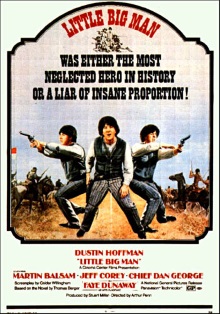
We haven’t seen much of Dustin Hoffman in recent years but he was once considered one of the greatest actors in the world. This one was made even in his career shortly after the success of The Graduate and there’s even a scene here that obvious references in. Little Big Man counts as a Western but it’s not like any other Western I’ve ever watched and I believe it’s one of the earliest instances of revisionist films that are critical of the US government’s treatment of Native Americans.
The 121-year old Jack Crabb, known as the sole white survivor of the Battle of Little Bighorn, is interviewed by a historian who initially believes him to be unsympathetic to Native Americans as a member of General Custer’s force. Enraged, Crabb tells the story of his life which begins with his entire family excepting himself and his older sister Caroline being killed by an attack by the Pawnee. They are found a Cheyenne brave who brings them back to his people. Caroline escapes but Jack is raised as one of their own, especially their chief Old Lodge Skins who he calls Grandfather. Due to his small frame but brave nature, he is named Little Big Man. After he grows up, he joins a skirmish against US soldiers and saves his life by showing that he is white man. He is then given over to the care of a preacher and his wife to learn Christian ways. He is quickly disillusioned however when he learns of the wife’s apparently many sexual affairs. In this way, Jack drifts between different roles both in white and Native American society, struggling to find his place.
It’s hard at first to decide what to make of this film. It’s unusual to say the least and rather amusing but seems to consist only of Crabb bouncing between different episodes of his life. Eventually however a pattern emerges. Practically every part of Crabb’s experience with life as a white man ends in disappointment and every single one of his guardians and mentors in the white world are flawed hypocrites. As my wife notes, the only truly wise character is Old Lodge Skins whose visions always come true. The biggest buffoon of course is General Custer with his perfectly coiffed blonde locks and an utter inability to acknowledge his mistakes. It’s pretty eerie how perfectly this version of Custer evokes Donald Trump in the present day.
A bigger surprise is how progressive the Native Americans are portrayed as. That the Cheyenne call themselves Human Beings is a small but powerful reminder to Americans not to see the world through the default white perspective. One of the characters is effectively a trans woman and the film shows that his tribe is content with his role in their society and Crabb remains friends with him throughout his life. The film does poke fun at his rival Younger Bear, especially during his time as a Contrary, a warrior who does the opposite of everyone one. It seemed to me like mocking Native American culture until I learned that they really do have such a role in their society though I doubt that it’s as silly as how it appears here.
This isn’t exactly a laugh out loud comedy but it’s plenty amusing and entertaining. I also enjoy anything that’s unusual or subverts the usual expectations and Little Big Man offers both in spades. I remember how Dances with Wolves was lauded for being a revisionist Western during my formative years. I now realize that not only did this film by Arthur Penn, the same director who made Bonnie & Clyde, have the courage to do it a solid twenty years earlier but that its mockery of the usual Western tropes is a far more incisive critique than the later film’s hand-wringing.